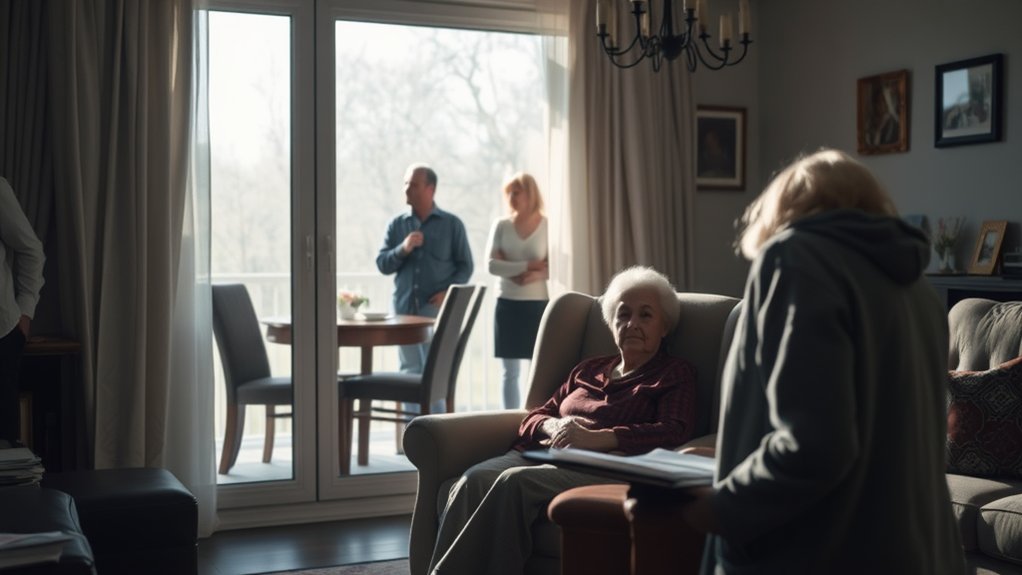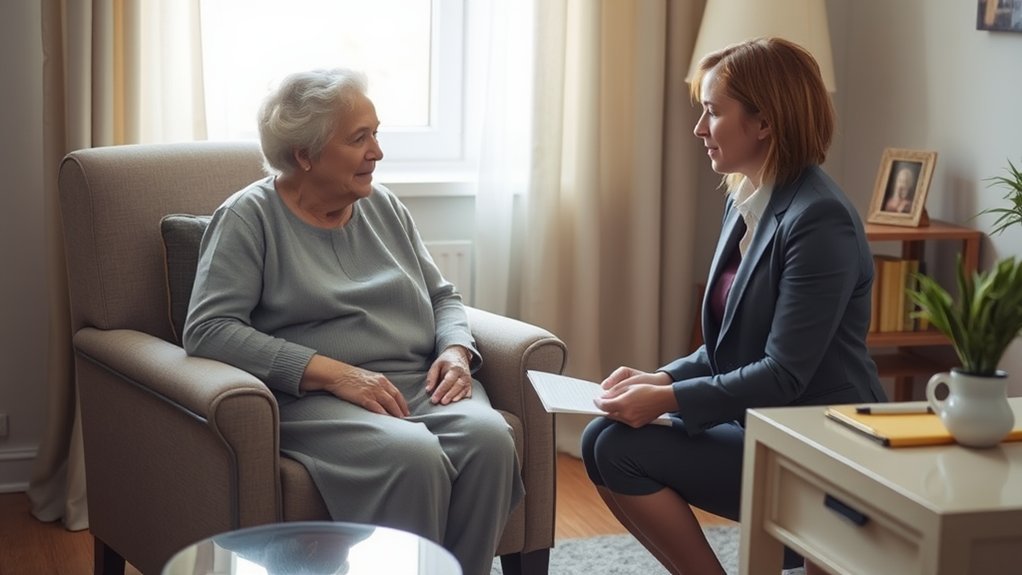Private senior care investigations require a unique blend of forensic expertise and emotional intelligence due to complex family dynamics and elder vulnerabilities. These cases demand strict adherence to healthcare privacy laws while gathering evidence through digital surveillance, medical records, and staff interviews. Investigators must balance professional objectivity with empathetic communication when interacting with seniors and families. Understanding the intricate relationship between medical documentation, financial records, and facility compliance reveals the full scope of potential misconduct.
Key Takeaways
- Private senior care investigations require delicate handling of complex family dynamics while maintaining professional objectivity throughout the process.
- Investigators must navigate strict privacy regulations and legal frameworks specific to senior care facilities and healthcare settings.
- Documentation demands are heightened due to medical records, care plans, and medication logs requiring specialized knowledge for proper analysis.
- Investigators need expertise in interviewing vulnerable seniors with cognitive or physical limitations while ensuring their comfort and trust.
- Digital evidence collection combines traditional surveillance with modern healthcare technology systems and electronic health records analysis.
The Delicate Balance of Family Dynamics

While investigating concerns about senior care often begins with suspicions of neglect or abuse, the complex web of family relationships frequently complicates these sensitive matters. Investigators must navigate through layers of historical family dynamics, personal grievances, and conflicting perspectives about what constitutes appropriate care.
The emotional impact of these investigations can strain already fragile family bonds. Siblings may disagree about care decisions, while elderly parents might resist changes to their routines. Effective family communication becomes essential during investigations, as misunderstandings can escalate tensions and hinder fact-finding efforts. Investigators must maintain professional objectivity while acknowledging that each family member brings valid concerns and experiences to the situation, creating a delicate balance between addressing care issues and preserving family relationships. Utilizing structured investigative approaches, investigators carefully document evidence through systematic interviews and case assessments to build a clear understanding of the senior care situation.
Legal Framework and Elder Care Regulations
The legal framework governing senior care facilities encompasses multiple layers of regulatory oversight, from state-specific licensing requirements to federal standards that guarantee quality care and resident safety. Each state maintains its own thorough licensing protocols for senior care providers, while federal regulations establish baseline requirements for facilities participating in Medicare and Medicaid programs. When violations occur, facilities must follow strict reporting procedures that typically involve notifying state agencies, documenting incidents thoroughly, and implementing corrective action plans within specified timeframes. Professional investigators can conduct comprehensive assessments to ensure facilities maintain proper documentation and compliance with regulations.
State Licensing Requirements
Maneuvering state licensing requirements stands as a critical foundation for conducting private senior care investigations. Each jurisdiction maintains unique state regulations governing investigative practices within senior care facilities, with licensing implications varying notably across regions.
| State Requirements | Investigation Type | License Class |
|---|---|---|
| Background Check | Facility Review | Class A |
| Insurance Bond | Abuse Cases | Class B |
| Annual Training | Neglect Claims | Class C |
| Ethics Course | Financial Fraud | Class D |
| State Exam | Medical Records | Class E |
Investigators must maintain current credentials while maneuvering complex regulatory frameworks that protect vulnerable seniors. These requirements guarantee professional standards, maintain investigative integrity, and safeguard the rights of elderly residents. Understanding and complying with these state-specific mandates proves essential for conducting thorough, legally-sound investigations within senior care environments.
Federal Oversight Standards
Federal oversight standards establish extensive frameworks governing private investigations within senior care facilities, encompassing multiple regulatory bodies and legislative mandates. These federal regulations create layers of compliance requirements that investigators must navigate while conducting their inquiries into elder care concerns.
Key oversight mechanisms include the Centers for Medicare and Medicaid Services (CMS) guidelines, the Elder Justice Act provisions, and HIPAA privacy regulations. Private investigators must maintain strict adherence to these standards while gathering evidence, interviewing staff, and documenting findings. Additionally, federal whistleblower protections and mandatory reporting requirements shape how investigations proceed, especially when uncovering potential abuse or neglect. Understanding these complex regulatory intersections is essential for conducting thorough, legally-compliant senior care investigations that protect vulnerable residents while preserving their dignity and rights.
Reporting Violations Protocol
Reporting violations in senior care facilities follows three primary legal pathways that investigators must understand and utilize appropriately: immediate notification to state regulatory agencies, documentation submission to federal oversight bodies, and communication with law enforcement when criminal conduct is suspected.
Investigation methodologies require meticulous documentation of violations through standardized forms, photographic evidence, and witness statements. Investigators must maintain detailed chronological records of their findings while conducting compliance auditing procedures. The collected evidence must align with state and federal reporting requirements, guaranteeing all documentation meets evidentiary standards.
Time-sensitive violations involving immediate resident safety require expedited reporting through emergency channels, while non-emergency violations follow standard submission protocols. This systematic approach guarantees proper handling of violations while protecting seniors’ rights and dignity.
Key Signs of Financial Exploitation
When elderly individuals face financial exploitation, certain warning signs often emerge that investigators must carefully monitor. Financial awareness becomes essential as perpetrators often exploit cognitive decline and isolation. Professional investigators routinely assess behavioral changes and document suspicious activities that may indicate exploitation in progress.
- Sudden changes in banking patterns, including large withdrawals, new accounts, or modifications to existing financial arrangements
- Unexplained disappearance of valuable possessions, important documents, or changes in property ownership
- Emergence of new “friends” who show excessive interest in the senior’s finances or attempt to isolate them from family
These warning signs require thorough documentation and swift professional intervention to protect vulnerable seniors from ongoing exploitation and prevent further financial losses.
Asset searches and financial investigations are crucial tools for uncovering evidence of elder exploitation and tracing misappropriated funds.
Medical Documentation and Record Analysis

A thorough analysis of medical documentation requires systematic comparison of treatment records across multiple care providers and facilities to identify potential inconsistencies or gaps. Investigators must carefully track medication administration logs, physician orders, and nursing notes to establish accurate treatment timelines and verify proper care protocols were followed. Cross-referencing dates, times, and specific medical interventions helps reveal any concerning patterns or unexplained deviations that warrant further investigation. Experienced investigators like those at Stillinger Investigations excel at uncovering hidden evidence through meticulous documentation review.
Detecting Record Discrepancies
Regular review of medical documentation in senior care facilities can reveal significant inconsistencies that warrant further investigation. Through systematic record verification methods and documentation auditing processes, investigators can identify patterns of discrepancies that may indicate potential negligence or misconduct. These inconsistencies often emerge when comparing different sources of documentation, including medication logs, staff notes, and incident reports.
- Temporal discrepancies between recorded events and documented responses, such as delays in recording medical interventions or inconsistent timestamps
- Mismatches between prescribed medications and administration records, including missing signatures, incorrect dosages, or unexplained alterations
- Inconsistencies between staff observations and official incident reports, particularly in cases involving falls, injuries, or changes in resident behavior
Tracking Treatment Timelines
Building upon record discrepancy findings, thorough timeline analysis of medical treatments represents a fundamental component of senior care investigations. Tracking methodologies must carefully document the sequence and duration of medical interventions, medications, and therapeutic services provided to seniors. Investigators systematically analyze these treatment patterns to identify potential gaps or irregularities in care delivery.
| Timeline Element | Investigation Focus |
|---|---|
| Medication Administration | Time stamps, dosage accuracy |
| Medical Procedures | Sequence, frequency, necessity |
| Staff Interactions | Duration, quality of care notes |
| Care Plan Updates | Implementation dates, follow-through |
Timeline analysis helps reveal patterns that may indicate neglect, insufficient staffing, or systematic care deficiencies. By establishing clear chronological records, investigators can better assess whether facilities maintain appropriate standards of care and respond promptly to residents’ changing medical needs.
Building Trust With Vulnerable Seniors

While conducting private investigations involving seniors, establishing genuine trust requires exceptional patience, sensitivity, and emotional intelligence. Building rapport with elderly individuals involves understanding their unique vulnerabilities and life experiences. Investigators must demonstrate genuine concern while fostering empathy through active listening and respectful communication.
- Create a comfortable environment by maintaining appropriate body language, speaking clearly but not condescendingly, and showing respect for the senior’s independence and dignity
- Allow seniors to share their stories at their own pace, validating their experiences while gently staying focused on relevant investigation details
- Demonstrate reliability through consistent follow-through, maintaining scheduled appointments, and providing regular updates in a way that makes seniors feel secure and valued
Just as with child custody investigations, maintaining the highest level of professionalism and discretion throughout the process is essential for protecting vulnerable individuals.
Surveillance Techniques in Care Facilities
Modern surveillance techniques in senior care facilities combine sophisticated technology with careful placement strategies to protect vulnerable residents. Hidden cameras installed in unobtrusive locations like wall clocks, picture frames, or air vents can document staff-resident interactions, while electronic tracking systems monitor employee movements and response times throughout the facility. Strategic monitoring of common areas through visible security cameras helps facility managers observe daily activities, identify potential risks, and guarantee proper care protocols are being followed. Professional investigators utilize specialized surveillance equipment to gather admissible evidence that can help facilities address potential instances of elder abuse or neglect.
Hidden Camera Placement Methods
Effective placement of hidden cameras in senior care facilities requires careful consideration of both technical and ethical factors. The selection of appropriate hidden camera types must balance quality surveillance capabilities with maintaining resident dignity. Investigators carefully evaluate room layouts, lighting conditions, and daily activity patterns to determine discreet placement locations that capture necessary footage while respecting privacy boundaries.
- Small pinhole cameras concealed within common room objects provide maximum discretion while maintaining clear sightlines to areas of concern
- Motion-activated devices positioned at strategic angles can document specific care interactions while minimizing unnecessary recording
- Wireless cameras with remote viewing capabilities allow real-time monitoring while reducing the need for frequent physical checks
The goal remains protecting vulnerable seniors while upholding their right to dignified care and personal privacy.
Staff Tracking Systems
Tracking staff movements and activities within senior care facilities requires sophisticated monitoring systems that balance accountability with employee privacy rights. These systems integrate real time tracking technologies with established care protocols to guarantee resident safety while maintaining professional standards.
Modern staff tracking solutions employ a combination of digital check-in stations, wearable devices, and mobile applications to monitor caregiver accountability throughout shifts. This technology enables supervisors to verify that scheduled rounds are completed, medications are administered on time, and emergency responses are prompt.
The data collected helps identify patterns in care delivery, optimize staffing levels, and document compliance with regulatory requirements. When implemented thoughtfully, these systems strengthen trust between families, residents, and care providers while protecting the dignity of all parties involved.
Monitoring Common Area Activity
Three critical zones within senior care facilities require vigilant surveillance: dining areas, recreational spaces, and movement corridors. These common areas serve as primary locations for resident engagement and social interaction, making them essential focal points for monitoring resident safety and well-being. Professional investigators analyze these spaces to identify patterns of behavior, potential safety hazards, and staff-resident interactions.
- Dining areas reveal social dynamics, nutritional compliance, and assistance protocols during meals
- Recreational spaces demonstrate levels of resident engagement, social bonds, and activity participation
- Movement corridors highlight mobility patterns, fall risks, and staff response times
Surveillance in these zones requires a delicate balance between maintaining security and preserving dignity. Investigators employ discreet monitoring methods while documenting common area interactions that may indicate care quality or potential concerns.
Digital Evidence in Senior Care Cases
Digital evidence has become increasingly essential in investigating allegations of elder abuse and neglect within senior care facilities. Surveillance footage, electronic health records, and digital communication logs provide critical documentation that helps establish patterns of care and potential misconduct. Investigators must carefully balance digital privacy concerns with the need to protect vulnerable seniors.
The reliability of digital evidence depends on proper collection and preservation methods. Investigators analyze access logs, medication administration records, and staff communication platforms to reconstruct timelines and verify witness statements. Digital timestamps, audit trails, and metadata can reveal inconsistencies in documentation or unauthorized alterations to records. This electronic footprint often proves invaluable in substantiating claims and identifying systematic problems within senior care environments. Advanced data extraction techniques enable investigators to recover deleted communications and location data that may reveal staff negligence or misconduct patterns.
Interviewing Strategies for Care Staff
When conducting interviews with senior care facility staff, investigators must employ specialized techniques that account for the complex dynamics and emotional challenges inherent in these cases. Through active listening and empathetic communication, investigators can create an environment where staff members feel comfortable sharing critical information while maintaining professional boundaries.
- Building rapport gradually, acknowledging the demanding nature of caregiving work, and demonstrating genuine understanding of workplace challenges
- Using open-ended questions that allow staff to explain situations in their own words while avoiding leading or judgmental language
- Maintaining awareness of potential hierarchical pressures, workplace dynamics, and fear of retaliation that may influence staff responses
These interviewing strategies help investigators gather accurate information while respecting the sensitive nature of senior care investigations and the perspectives of those involved. Understanding that traditional detection methods are limited makes staff interviews an essential tool for uncovering potential abuse or neglect.
Collaborating With Healthcare Professionals
Successful private senior care investigations often hinge on establishing productive partnerships with medical professionals who interact with elderly residents. Through interdisciplinary collaboration, investigators gain valuable insights into residents’ medical histories, behavioral changes, and potential signs of abuse or neglect. Healthcare professionals can provide critical documentation, expert opinions, and contextual understanding of medical conditions that may impact the investigation.
Patient advocacy becomes more effective when investigators maintain open communication channels with physicians, nurses, social workers, and therapists. These relationships allow for timely information sharing, joint problem-solving, and coordinated responses to concerns. Healthcare professionals can also help investigators understand complex medical terminology, interpret care plans, and identify deviations from standard care protocols. Their expertise strengthens the investigative process and helps guarantee accurate assessment of senior care situations. The implementation of structured approaches during investigations helps maintain fairness and integrity when evaluating potential cases of elder abuse.
Reporting Standards and Documentation
Professional documentation forms the cornerstone of effective senior care investigations, requiring meticulous attention to detail and standardized reporting protocols. Quality assurance measures guarantee that all investigative procedures are properly recorded, creating a thorough trail of evidence and observations. Investigators must maintain detailed records that protect both seniors and care providers while facilitating transparent communication among stakeholders. Similar to FCRA compliance standards, background checks in senior care require explicit consent and adherence to privacy regulations.
- Chronological documentation of all investigative steps, including interviews, observations, and collected evidence, with precise timestamps and location data.
- Standardized forms and templates that capture essential information consistently across cases, making sure no critical details are overlooked.
- Secure digital and physical filing systems that maintain confidentiality while allowing authorized access for review, analysis, and legal proceedings when necessary.
Frequently Asked Questions
How Much Does a Private Senior Care Investigation Typically Cost?
Private senior care investigation costs typically range from $1,500 to $5,000, varying based on investigation scope, duration, surveillance needs, and complexity of elder care facility documentation review.
What Percentage of Senior Care Investigations Result in Criminal Charges?
Criminal prosecution rates for elder abuse investigations vary widely, with studies indicating only 1-10% of cases result in charges, despite elder abuse statistics suggesting higher prevalence of actual incidents.
How Long Does an Average Senior Care Investigation Take to Complete?
Senior care investigation duration typically ranges from two to six months, depending on case complexity, evidence gathering requirements, witness availability, and documentation review processes involved in each situation.
Can Family Members Participate in the Investigation Process?
Family involvement in senior care investigations varies by case. Relatives can provide essential information, monitor progress, and assist investigators, though professional boundaries must be maintained throughout investigation roles.
Are There Specialized Certifications for Investigators Focusing on Senior Care Cases?
Investigators can obtain specialized training in elder abuse investigation, healthcare facility protocols, and ethical considerations specific to senior care. Professional certifications through recognized organizations enhance credibility and investigative competence.
Conclusion
Private senior care investigations require a multifaceted approach that balances legal compliance, medical expertise, and emotional sensitivity. Investigators must navigate complex family dynamics while meticulously documenting evidence of potential abuse or negligence. Success depends on building trust with vulnerable seniors, collaborating effectively with healthcare professionals, and maintaining rigorous reporting standards. This specialized field demands both technical proficiency and deep understanding of elder care issues.





